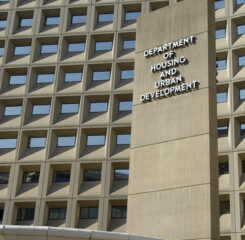Section 202 Prepayment and Refinancing: HUD Issues New Requirements
The new requirements have been published to implement changes in the prepayment law enacted by the Section 202Supportive Housing for the Elderly Act of 2010 (Public Law 11-372), signature legislation advocated by LeadingAge and our members and passed in the 2010 lameduck session of Congress. The legislation streamlines and clarifies the prepayment and refinancing policies governing the preservation of Section 202 properties and makes it possible to refinance and rehabilitate the oldest cohort of Section 202 properties, those with interest rates of 3% and often without rental assistance.
Section 202 prepayment
The notice provides procedures for the prepayment of all Section 202 direct loans, those which require the secretary’s approval and those which do not, procedures for those which choose to enter into a long term use agreement (20 years), and procedures for those with section 8 contracts which request continued renewals and exemptions from mark to market. It supersedes all prior guidance on prepayment and refinancing. Section V of the notice addresses the requirements for approval of prepayment of the 202 debt where HUD consent is required. One major change is the requirement that a long term use agreement which extends affordability 20 years after the original mortgage maturity must be signed between the sponsor and HUD and recorded.
Under prior requirements the use agreement extended only to the original maturity date. Now prepayment and refinancing is a long term preservation tool.
This section lists all the requirements including:
- The use agreement, which binds current and future owners.
- Reporting requirements, including financial reports and audits, occupancy reports, conditions of the property as HUD may request, HAP renewal including exemption from mark to market, 20 year contract.
- Section 8 rents as an exception rent property under the first refinancing only.
- Energy efficiency repairs, unit conversions as under Housing Notice 11-03.
- Additions or rehabilitation of related facilities, including dining rooms, kitchens, health and other supportive services related spaces for aging in place.
- Accessibility improvements.
- Acceptable project ownership including tax credit partnerships and limited liability corporations.
- Use of residual receipts.
- Tenant involvement.
- Environmental reviews, temporary relocation actions such as reimbursements, permanent moves, right of first refusal.
Section VI covers requirements for prepayments that do not require HUD consent. During the period of around 1977 to 1982, the mortgage note includes language that permits the prepayment of mortgages with only a 30 day notice to the HUD Hub and notification to the project residents as outlined in Section XI of the notice.
HUD HQ’s Office of Asset Management will them provide confirmation of the prepayment. If the owner of the project voluntarily complies with the requirements under Section V and VII of the notice and enters into a long term use agreement, the project will not be subject to mark to market after a refinancing involving Federal Housing Administration (FHA) insurance. If not, the project could be subject to mark to market.
Refinancing that reduces debt service
Section VII of the notice covers the requirements for a refinancing that results in the reduction of debt service, the original purpose of the initial prepayment law which was intended to recapitalize mortgages with interest rates well above 6% in a much lower interest rate environment.
For these loans, the owner who wishes to refinance must demonstrate that the prepayment and refinancing will result in a reduction in debt service by including a detailed sources and uses of loan proceeds and a summary financial analysis.
The savings must be expressed in a dollar amount, but no longer must the savings be escrowed or placed in any kind of special account such as a trust fund.
Under the prior requirements each HUD office established its own requirements or not for the debt service savings and required long term reporting related to those savings.
Each owner must detail how loan proceeds will be used in the project from the prepayment of the loan balance, rehabilitation or retrofit costs, and proceeds in excess of those costs.
All loan proceeds must be placed in a segregated account at closing of the transaction and spent within five years of closing.
Approval of the prepayment request will be construed as approval of all proposed uses of proceeds including social services such as congregate meals or service coordinators that equal not more than 15 percent of the cost of the supportive service unless the Secretary waives the limitation to better serve seniors aging in place.The waiver request should be a part of the prepayment package.
The proceeds can be used as well for rehab, modernization, retrofitting including unit reconfiguration; construction of an addition or other facility in or adjacent to the project. With HUD approval, the owner may pool proceeds of several refinancing within the same geographical region to construct the additions or other facilities.
Payment of developer fees
Section VII also establishes the payment of a developer’s fee for both Low Income Housing Tax Credit and non-tax credit transactions, other transaction costs, and requirements for the use of proceeds in other HUD assisted senior housing properties or tenants of other properties with residents with similar eligibility characteristics.
In the prior requirements, proceeds could be spent on current tenants of the property only. For the other projects which benefit from proceeds from a refinancing, a use agreement must be executed for at least 10 years beyond the date of closing of the refinance.
Finally, the proceeds may be used to reduce the rents of unassisted residents of the project that is refinanced as residents can not have their rents increased as a result of the refinancing.
Section VII also outlines the various monitoring actions that HUD will undertake to monitor the proceeds and the reports and documents that the owner must provide.
Section 8 rent increases
Section VII addresses Section 8 rent increases for operational increases where there is debt service savings; such rent increases may be justified under the requirements of a budget based rent increase in the Section 8 Renewal Guide.
Refinancing for physical needs of project
Section VIII addresses the requirements for refinancing to address the physical needs of the project. It will apply to the oldest cohort of Section 202 properties, those built between 1959 and 1974.
These loans carry interest rates below 6%, typically 3% and represent those properties with the greatest capital repair needs and those often without rental assistance.
These properties typically have not been able to refinance because they never met the test of refinancing to reduce debt service. For these properties an increase in the interest rate is expected as is an increase in debt service to cover the expected significant capital repair costs.
The requirements include the following:
- Rents for unassisted residents may not be increased; however, HUD may provide new rental assistance for those unassisted residents under the new Senior Preservation Rental Assistance Contracts (SPRAC). HUD expects to issue guidance shortly for the SPRACs. In certain cases HUD may issue tenant protection vouchers as described in Notice H 2012-03.
- Section 8 rents may be increased to cover the costs of the transaction including prepayment of the debt and the costs of capital repairs. The increases may be provided under mark up to market or mark up to budget as described in Chapter 15 of the Section 8 Renewal Guide.
The refinancing must include capital repairs equal to substantial rehabilitation as defined by the HUD MAP Guide, including such costs as unit reconfiguration from efficiencies to one bedrooms.
A demonstration of substantial rehab can be met by submission of a Project Capital Needs Assessment or the submission of architectural plans and specifications which may have been prepared for the financing of the project including tax credits.
Use of proceeds must comply with the requirements under Section VII.
Refinancing a project already refinanced in Section IX
The notice also covers requirements for a refinancing of a project already refinanced in Section IX. These requirements will apply in the case of 202s that refinanced when the authority to do so first became available and when interest rates may have been higher or certain repairs could not be made because there were insufficient proceeds after the prepayment.
At that time the properties maintained their exception rent status and were not subject to mark to market.
In this notice, HUD establishes a new policy that if a project is refinanced with a HUD insured mortgage for a second time it will no longer be considered an exception rent project and may be subject to mark to market.
While this policy seems to ignore the law, it is HUD’s position that once there has been a refinancing the project is no longer considered a 202. There may be some ability to request a waiver of this provision in cases where a second refinancing is necessary to do essential capital improvements and for preservation on a case by case basis.
Only time will tell.
One way to maintain the exception rents is to refinance the mortgage without using FHA insurance.
Additional considerations
Section X of the notice outlines additional considerations depending on the structure of the refinancing and the source of financing including waivers of payment of flexible subsidy debt, subordination and/or assumption of the Section 202 debt to facilitate preservation, the use of FHA mortgage insurance, continuation of the rent supplement contract, and subsidy layering reviews. It provides references to already existing guidance and notices.
Tenant involvement in prepayment and refinancing
Section XI of the Notice outlines requirements for tenant involvement in a prepayment and refinancing transaction including notification to tenants of the impending prepayment and offering an opportunity to comment on the proposed plans.
This section also requires that the owner respond to any comments and include those responses in the prepayment application.
Procedural requirements for application
Section XII lists the procedural requirements for completing an application to refinance and prepay the Section 202 mortgage including a mandatory meeting with the HUD field office to discuss a variety of topics such as:
- The type of prepayment.
- Tenant notice requirements.
- Benefits to the tenants of prepayment.
- Any potential waiver requests.
- Disposition of reserves and residual receipts.
- The use agreement.
- Future rental assistance, either SPRAC or vouchers.
- The refinancing options.
- Use of proceeds.
It also outlines the owner submission requirements including the request form, HUD documents for the project, details of the capital improvement, the financing proposed, the resident population characteristics and names, required narratives about the use of proceeds, the benefits to the residents, and requested new rental assistance.
How HUD processes the application
Section XIII of the notice outlines how HUD will process the application including requiring a HUD multifamily HUB to assess the application within 30 days of receipt of the complete package following certain steps. The HUB then submits its recommendations to the HUD HQ Office of Asset Management for review.
Waiver requests of any requirement can only be approved by HUD HQ.
While the notice provides detailed guidance there will continue to be questions on a deal by deal basis that you should feel free to raise as they come up.
The notice provides a detailed framework, but does not answer every situation that may arise.
As an owner you should be sure to work with lenders and attorneys who can help you navigate the process.

Most Recommended
November 08, 2024
 HOTMA: New Rules for Housing
HOTMA: New Rules for Housing
November 06, 2024
 Colleagues on the Move, November 6, 2024
Colleagues on the Move, November 6, 2024
November 06, 2024
 Analysis: What Does the Final CY2025 Home Health Rule Include?
Analysis: What Does the Final CY2025 Home Health Rule Include?
October 29, 2024
Katie Smith Sloan Urges Members to Build a Movement, Take Action
Recently Added
December 13, 2024
CAST Members in the News
December 13, 2024
a2 Pilot Awards Open for AI-based Healthy Aging Projects
December 13, 2024
HUD Finalizes 30-Day Eviction Notification Rule
December 12, 2024



